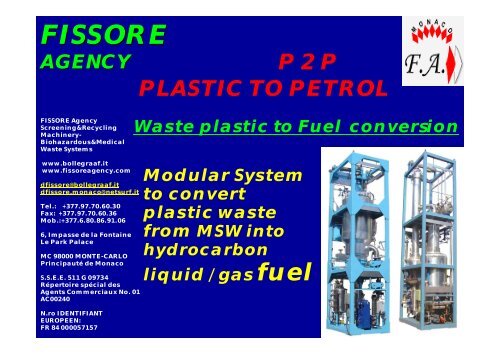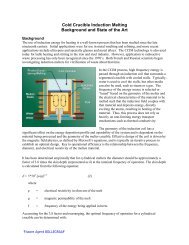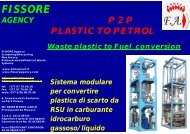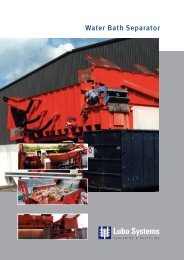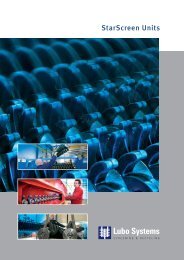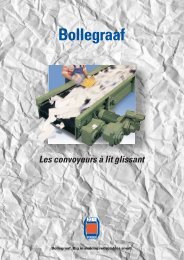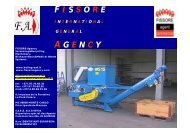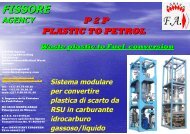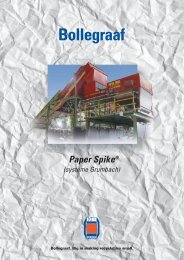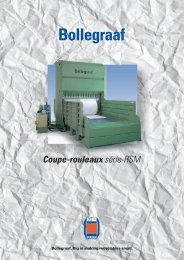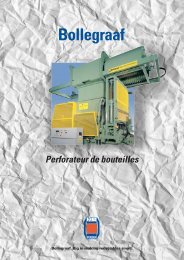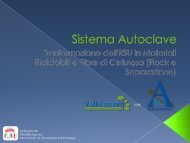3) P2P FROM PLASTIC TO PETROL - Mar 08 - FISSORE Agency
3) P2P FROM PLASTIC TO PETROL - Mar 08 - FISSORE Agency
3) P2P FROM PLASTIC TO PETROL - Mar 08 - FISSORE Agency
You also want an ePaper? Increase the reach of your titles
YUMPU automatically turns print PDFs into web optimized ePapers that Google loves.
<strong>FISSORE</strong><br />
AGENCY<br />
P 2 P<br />
<strong>PLASTIC</strong> <strong>TO</strong> <strong>PETROL</strong><br />
<strong>FISSORE</strong> <strong>Agency</strong><br />
Screening&Recycling<br />
Machinery-<br />
Biohazardous&Medical<br />
Waste Systems<br />
Waste plastic to Fuel conversion<br />
www.bollegraaf.it<br />
www.fissoreagency.com<br />
dfissore@bollegraaf.it<br />
dfissore.monaco@netsurf.it<br />
Tel.: +377.97.70.60.30<br />
Fax: +377.97.70.60.36<br />
Mob.:+377.6.80.86.91.06<br />
6, Impasse de la Fontaine<br />
Le Park Palace<br />
MC 98000 MONTE-CARLO<br />
Principauté de Monaco<br />
S.S.E.E. 511 G 09734<br />
Répertoire spécial des<br />
Agents Commerciaux No. 01<br />
AC00240<br />
N.ro IDENTIFIANT<br />
EUROPEEN:<br />
FR 84 000057157<br />
Modular System<br />
to convert<br />
plastic waste<br />
from MSW into<br />
hydrocarbon<br />
liquid / gas fuel
<strong>FISSORE</strong><br />
AGENCY<br />
P 2 P<br />
<strong>PLASTIC</strong> <strong>TO</strong> <strong>PETROL</strong><br />
La VULCANES Ltd Environmental Expertise<br />
( www.vulcanes.com )<br />
in partership with<br />
Oil Field Tekniks Environmental Expertise<br />
and its General Agent<br />
<strong>FISSORE</strong> <strong>Agency</strong> 6, Impasse de la Fontaine- Monte-Carlo, Principato di Monaco<br />
already Bollegraaf Recycling Machinery’s General Agent<br />
are honored to present to the market this fantastic product!
<strong>FISSORE</strong><br />
AGENCY<br />
Polycrack System:<br />
how to convert Plastic waste into petrol ( and other fuels)<br />
The currently abundant existence of waste plastics<br />
needs a solution.<br />
Vulcanes<br />
P 2 P<br />
<strong>PLASTIC</strong> <strong>TO</strong> <strong>PETROL</strong><br />
Presents a new and innovative technology for the<br />
conversion of plastic waste into fuel gases and<br />
liquids, using a catalytic conversion method, than<br />
innovative to be examined and, with great<br />
satisfaction, awarded with the “gold medal for the<br />
best invention of 2007 for the waste treatment“ by the<br />
University of Texas (IC2), together with the Federation<br />
of Indian Chambers of Commerce (FICCI), through the<br />
LOCKEED <strong>Mar</strong>tin’s “Innovation and Growth<br />
Program”.
<strong>FISSORE</strong><br />
AGENCY<br />
P 2 P<br />
<strong>PLASTIC</strong> <strong>TO</strong> <strong>PETROL</strong>
<strong>FISSORE</strong><br />
AGENCY<br />
P 2 P<br />
<strong>PLASTIC</strong> <strong>TO</strong> <strong>PETROL</strong><br />
In the further presentation to the market, held in England on June'07 for a limited number of Customers coming from all the world,<br />
were shown, in addition to the widening of the process “ from plastics to fuel with a single catalyst!“, the further features of<br />
the <strong>P2P</strong> System: the now official possibility of dealing with the same plant, without any variation:<br />
a) Organic and vegetable waste… (so renewable energy sources!) obtaining ethanol and natural gas;<br />
b) Fluff (all plastics) from shredded cars;<br />
c) Plastics from electronic and bio-medical waste;<br />
d) Green and lopping waste obtaining ethanol .<br />
e) Oil and similar from kitchen waste (fried and others!) obtaining fuel;<br />
f) Palm Oil and waste (fuel and LPG);<br />
g) All kind of vegetable oil (fuel and LPG);<br />
h) Waste from treatment of all kind of vegetable oil (fuel and LPG);<br />
i) Cellulose and paper factory waste (like Pulper!), obtaining natural gas;<br />
j) Fats and animals waste (obtaining fuel and LPG);<br />
k) Animals Excrements of any kind and therefore from rabbits, horses, pigs, sheep, cows, chickens and so on (natural gas)<br />
l) Slushes of refineries (fuel and LPG);<br />
m) Tar and bitumen exhausted (fuel and LPG);<br />
n) Much other kind of slush (for example from sewer plants!), obtaining natural gas; Specifically, we have a patented chemical<br />
reagent able to separate in less than 1 minute white water from solid waste!<br />
o) FLOCK (natural gas); is well to remember here that the flock is the cellulose fiber in which the organic material is transformed<br />
as well as paper, cardboard and small pieces of wood, obtained by the AU<strong>TO</strong>CLAVE treatment … without forgetting that this<br />
flock that can be used for the construction of multilayer boards and subsequent manufacture of furniture, or anti-seismic or<br />
sound-absorbing panels… or even burned, developing electricity: 5.6 mW/h constant from a 2 autoclaves plant… but in case it<br />
is possible to process it the existing plant and without being forced to purchase additional equipment, in fact, you can insert<br />
it in <strong>P2P</strong> plant and obtain abt. 30-35% of methane, while the other part will be turned into "COKE", which finds good use as a<br />
"filter" in all LPG plants, and in creating anti-radioactive products such jackets and so on, or even, as mentioned previously,<br />
as "blacksmoke" in the manufacture of reconditioned or traditional tires except those for high speed. These processes are<br />
increasingly adding to the now famous treatment “fuel from plastics” and are all GUARANTEED in their perfection and<br />
performance. Finally, with effect from 20 August'07 is available, in India, a smaller plant and therefore reduced capacity<br />
compared to the standard, but fully functional and made available to Customers for any type of test!<br />
ALL our systems are ZERO air e mission
<strong>FISSORE</strong><br />
AGENCY<br />
P 2 P<br />
<strong>PLASTIC</strong> <strong>TO</strong> <strong>PETROL</strong><br />
“Demo Polycrack System”<br />
In the further presentation held on 0ctober 2007, in Mumbai, India, world premiere<br />
for the Customers who wanted to be present to witness their great interest…<br />
in a <strong>P2P</strong> plant fully functional, it has witnessed to the various processes of<br />
transformation of plastics into fuel, and some questions have raised directly to the<br />
inventor Ing. T. R. RAO (our Partner and co-shareholder, recently awarded by the<br />
gold medal for “The best invention of 2007 for the waste treatment”), and has been<br />
demonstrated, with great astonishment of those present, the capacity of the machine<br />
to move from one type of work to another one without having to stop the cycle or<br />
make whatsoever changes!<br />
T.R. Rao<br />
Partner Vulcanes<br />
tr.rao@vulcanes.com
<strong>FISSORE</strong><br />
AGENCY<br />
“Demo Polycrack System”<br />
MUMBAI , 0tt0bre 2007<br />
We underline, with great pride and enthusiasm that<br />
the<br />
A) EXHAUST TIRES<br />
P 2 P<br />
<strong>PLASTIC</strong> <strong>TO</strong> <strong>PETROL</strong><br />
<strong>P2P</strong> system is able to treat also:<br />
B) EXHAUST OILS <strong>FROM</strong> VEHICLES (cars, trucks, moto,<br />
etc.) leaving directly to the Customer the<br />
possibility to transform them into diesel-gasoline<br />
or to PURIFY completely the product for resale as a<br />
“base oil" ready to be added!<br />
ALL our systems are ZERO air e mission
<strong>FISSORE</strong><br />
AGENCY<br />
P 2 P<br />
<strong>PLASTIC</strong> <strong>TO</strong> <strong>PETROL</strong>
<strong>FISSORE</strong><br />
AGENCY<br />
P 2 P<br />
<strong>PLASTIC</strong> <strong>TO</strong> <strong>PETROL</strong><br />
Following one of the many (really a lot!) press releases published in Spain on <strong>Mar</strong>ch 20<strong>08</strong> the 5th,<br />
in reference to the agreement signed between the Velez MALAGA Authorities and VULCANES Ltd,<br />
about to the FIRST AU<strong>TO</strong>CLAVE+<strong>P2P</strong> plant, establishing the plastics transformation into fuel (<strong>P2P</strong>)<br />
as well as the flock use to procreate methane gas and consequently electrical and thermal<br />
ENERGY.
<strong>FISSORE</strong><br />
AGENCY<br />
1. Company profile Vulcanes Ltd<br />
Vulcanes Ltd originates from a global network-organisation across the recycling Industry.<br />
Vulcanes is a young organisation with expertise in the field of:<br />
• WTE (Waste To Energy)<br />
• MSW (Municipal Solid Waste)<br />
• Biomass<br />
• Industrial Waste<br />
• C&D (Construction and Demolition)<br />
• Muds/Sludges Treatment<br />
P 2 P<br />
<strong>PLASTIC</strong> <strong>TO</strong> <strong>PETROL</strong><br />
Vulcanes offers as a System Integrator turnkey solutions bringing together the most advanced<br />
and reliable technologies in the market. These custom made turnkey solutions are characterized<br />
by high return on investments, high efficiency and are highly innovative.<br />
Furthermore Vulcanes offers consultancy, environmental solutions and project management.<br />
The scope of work for project management can vary from delivering management services up to<br />
the complete staffing and field operations. In order to secure the required customers operational<br />
and financial result.<br />
Vulcanes employs a dedicated team of engineers, project managers and experts. These<br />
professionals have a proven track record in the industry with numerous references of successful<br />
installations and showcases in the market. Vulcanes has access tot a worldwide network of<br />
expertise in the environmental market.<br />
Vulcanes has the exclusive global Oil Field Tekniks dealership for <strong>P2P</strong> systems.<br />
Vulcanes, with <strong>FISSORE</strong> AGENCY, distribution for the Oil Field Tekniks <strong>P2P</strong> systems, and<br />
Aerothermal English Autoclave systems is worldwide.<br />
ALL our systems are ZERO air e mission
<strong>FISSORE</strong><br />
AGENCY<br />
Oil Field Tekniks is a Research and Development organization, specialized in developing technologies for converting<br />
Petroleum and Petrochemical wastes into usable value added products. Backed by a team of engineers and<br />
developers with years of experience handling hydrocarbon wastes, the company has developed many technologies<br />
for the utilization of waste material as useful products. The personnel involved in Oil Field Tekniks have vast<br />
experience in the Petroleum industry and understands the petroleum and petrochemical products well to develop<br />
technologies that can mitigate the waste problems. Following are some of the technologies developed,<br />
commercialized and under commercialization.<br />
Bitumen to Furnace Oil Conversion - Desulphurization of Diesel Fuels - Conversion of waxy sludge to fuel oil -<br />
Conversion of sludge to bio-fertilizer -Development of chemicals for water purification - Development of chemicals<br />
for tank cleaning - Aqueous phase tank cleaning systems<br />
The strength of the company is its understanding of the basic materials and the knowledge to convert problems into<br />
solutions<br />
We offer :<br />
Innovative solutions<br />
Cost effective<br />
Environmentally friendly<br />
Safe and reliable technology<br />
Commitment to quality<br />
Global presence<br />
Service orientation<br />
Problem specific solutions<br />
In house designing capability<br />
Fully integrated systems for internal and external<br />
Any kind of muds Treatment<br />
P 2 P<br />
<strong>PLASTIC</strong> <strong>TO</strong> <strong>PETROL</strong><br />
2. Company profile Oil Field Tekniks<br />
ALL our systems are ZERO air e mission
<strong>FISSORE</strong><br />
AGENCY<br />
P 2 P<br />
<strong>PLASTIC</strong> <strong>TO</strong> <strong>PETROL</strong><br />
Oil Field Tekniks,<br />
5.1 Introduction<br />
introduces a new and innovative technology for the conversion of waste<br />
plastics into useful fuel oil, using a catalytic conversion method.<br />
Il mondo sta affrontando il problema dello smaltimento dei rifiuti in<br />
plastica. The world is facing the problem of disposal of waste plastics.<br />
The ease of manufacture and the abundant availability of plastics in all<br />
wakes of life, have created a situation where the useless and waste<br />
plastics from the abandoned electronics, carry bags, automobile<br />
accessories etc. Unless, economic disposal methods are found out, world<br />
will see the menace of soil degradation, loss of water table and many<br />
other problems associated with the non-biodegradable plastics.<br />
Even though, the scientists are working on the manufacture of<br />
biodegradable plastics, the existence of abundant waste plastics<br />
currently, needs a solution.<br />
Based on this reasoning, the novel catalytic conversion technique has<br />
been developed and successfully tested.<br />
ALL our systems are ZERO air e mission
<strong>FISSORE</strong><br />
AGENCY<br />
P 2 P<br />
<strong>PLASTIC</strong> <strong>TO</strong> <strong>PETROL</strong><br />
5.2 Principles involved<br />
Plastics are polymers containing carbon and hydrogen and few other<br />
elements like chlorine, nitrogen etc. polymers are a group of monomers<br />
combined together to form a single larger molecules called polymers.<br />
Polymers are High molecular weight molecules and when they degrade<br />
i.e when they break, they form low weight molecules called monomers.<br />
This is the reverse reaction of forming polymers from monomers. This<br />
process is called Degradation of polymers.<br />
In the process of conversion of waste plastic into fuels Degradation of<br />
Polymers takes place. The degradation polymers must happen in the<br />
absence of oxygen at a high reaction temperatures and in the presence of<br />
a Catalyst. The presence of oxygen or absence of catalysts will make the<br />
process into a melting of plastic process followed by the plastic getting<br />
converted to coke.<br />
ALL our systems are ZERO air e mission
<strong>FISSORE</strong><br />
AGENCY<br />
In the process, waste plastic is heated to the reaction temperatures inside a Reaction vessel, in the presence of a catalyst. The<br />
plastic then starts degrading into low molecular weight monomers. The monomers re-combine to form petroleum vapours having<br />
different chains of hydrocarbons. The vapours are condensed to form light fuels. Here, the catalysts play a vital role and with the<br />
tweaking of catalysts we can convert the plastics to either LPG or Liquid fuels similar to Petrol .<br />
Input<br />
Assorted waste plastic<br />
Catalyst about 5%<br />
Temperature<br />
250-4000°C<br />
Pressure<br />
Atmospheric<br />
Batch<br />
continuous<br />
The product yields Quantity (wt %)<br />
Gas 10-15<br />
Liquid hydrocarbons 70-80<br />
Coke 7/10<br />
Typical analysis of the gaseous product is given in the following table:<br />
S.No Component Quantity (w/w %)<br />
1 Methane 7.0<br />
2 Ethane + ethylene 11.0<br />
3 Propane 7.5<br />
4 Propylene 28.0<br />
5 so - butane 2.0<br />
6 n-Butane 1.0<br />
7 C4 (unsaturated) 25.5<br />
8 Iso C5-n-C5 0.1<br />
9 C5+higher 15.3<br />
10 Hydrogen 2.6<br />
11 CO/CO2
<strong>FISSORE</strong><br />
AGENCY<br />
P 2 P<br />
<strong>PLASTIC</strong> <strong>TO</strong> <strong>PETROL</strong><br />
5.3 Waste plastic Yield informatio n<br />
Typical analysis of the liquid product is given in the follo wing<br />
table<br />
S. No. Carbon Number Quantity (w/w %)<br />
1 Up to C10 62.0<br />
2 From C10 to C13 2.5<br />
3 From C13 to C16 7.5<br />
4 From C16 to C20 4.0<br />
5 From C20 to C23 7.5<br />
6 From C23 to C30 16.5<br />
ALL our systems are ZERO air e mission
<strong>FISSORE</strong><br />
AGENCY<br />
P 2 P<br />
<strong>PLASTIC</strong> <strong>TO</strong> <strong>PETROL</strong><br />
5.4 The Process<br />
The process technology is designed to be a flexible system to convert the plastics into liquid, gaseous or mixture<br />
products. By changing the catalyst mix we can obtain either LPG, mixture of LPG and petrol like fuels or a<br />
mixture of both. The system has the flexibility of production and in case large quantities have to be handled<br />
then, additional modules can be added. Each module is designed for 20 tons per day production capacity.<br />
However smaller modules can be provided.<br />
5.5 Process Assembly<br />
1. Plastic Preheating and filtration.<br />
Plastics is a solid substance. Plastics are segregated from other waste coming from the Municipal solid waste or any<br />
other industrial locations. The waste plastics are cleaned in an autoclave system to remove debris and<br />
contamination. The cleaned plastics have reduced volume.<br />
Plastics are preheated and brought into a molten condition into the Reactor vessels .<br />
The system consists of a Hopper which holds 2 tons of waste plastic. The Hopper delivers plastic material through a<br />
conveyor system to a pre-heater. The pre-heater is heated through Thermic fluid up to a temp. of 250°C. The<br />
plastic throughput is measured and the heating cycles are adjusted to the feed rate .<br />
2. Heating and Catalyst Mixing.<br />
The molten plastic is then pumped into airtight reactors. The reactor is purged with Nitrogen to create a flameproof<br />
environment. The plastic is then heated from app 250 deg C to 380 deg C. The powder catalyst specially<br />
formulated for this reaction is then added through a pressure feed pump. The reactors have a holding<br />
capacity of 5 tons. Plastic is fed in the molten stage continuously into the reactors along with the catalyst. The<br />
Reactors have the capacity to convert 25 tons of plastic per day. Higher capacities can be achieved by adding<br />
more reactor modules to the system.<br />
ALL our systems are ZERO air e mission
<strong>FISSORE</strong><br />
AGENCY<br />
3. Reaction in vessels<br />
The mixture is heated and the reaction in the presence of the Catalyst will from hydrocarbon vapours. However, the vapours are emanated from<br />
heavier chains and similar to polymers in structure. The catalyst helps to re-group the molecules to form light gases, which are then evacuated to<br />
the condensers.<br />
The plastics can be of many forms. They can be PP, PET, PE, HDPE, LDPE, PVC etc. The nature of the plastics is immaterial as the process is<br />
capable of handling individual grades of plastics or a combination of them. All these materials are long chain hydrocarbons and they are very<br />
stable. Therefore, when we heat them and cool them again, they will attain the original status and convert back into semi-solid material.<br />
However, in the presence of the Catalyst, the long chains are broken and the molecules re-group into lighter hydrocarbon fractions. Therefore,<br />
when cooled and condensed, the vapours attain the state of a light hydrocarbon fuel such as Petrol.<br />
The vapours consist of two phases, condensable gases and non-condensable gases.<br />
4. Vapour Condensation<br />
The mixture of condensable and non-condensable gases from the reactors is force fed into a dual condenser system where the light factions,<br />
middle distillates are condensed and recovered as fuel. During the vapour phase, many factions of distillate are formed having different boiling<br />
points. Therefore, the condensation is done in two stages to condense the vapours into two ranges of boiling points and thus distillates are<br />
recovered. Major portion of the condensate is normally a diesel faction. The condensable factions are condensed and the non-condensable form<br />
is evacuated and mixed with air to act as fuel for feeding the burners. Thus, the waste gas is converted into a fuel and not released into the<br />
atmosphere as a gas. The calorific value of this gas estimated to be above 10,000 KCal.<br />
The condensation system can be custom designed to manufacture a mixed fuel or distillated products. Thus, the re-combining of the<br />
hydrocarbon chains can be tailor made to suit the plant output requirements. Gasoline, Diesel, fuel oils, naphtha, petrol etc. can be distilled as<br />
separate products from the system if the output plan is for such a range of products.<br />
The most common stream is a single condensate which can be used as a fuel oil are a diluent to the furnace oils, or furnace oil quality fuel to feed<br />
Gen sets.<br />
The condensation system is grouped in one single skid and the parameters are controlled automatically with in-built electronic controls .<br />
5. Condensate to tankage<br />
P 2 P<br />
<strong>PLASTIC</strong> <strong>TO</strong> <strong>PETROL</strong><br />
The condensate from the dual condensers is collected into the storage tanks. The product at this stage is free from solid particles and water. The<br />
product specifications match or exceed that of diesel fuel. Sometimes based on the input, we may get a product similar to Fuel oil but with low<br />
viscosity in the range of 2 to 5 cst. Generally these fuels have lower sulphur content compared to distillate fuels.<br />
ALL our systems are ZERO air e mission
<strong>FISSORE</strong><br />
AGENCY<br />
The storage capacity of the plant is 400 kl sufficient to store 5 days of production. The tanks can be earmarked for<br />
each individual faction, if that is the need to be. However, in single product output plant, all the tanks are utilized<br />
for storing one fuel.<br />
6. Non-condensable to Re-ignition.<br />
The entire process is heat dependent. We have to raise the temperature of the system quite considerably. To<br />
achieve this we use liquid fuels. However, the burners are designed for a combined fuel ignition. We can use<br />
liquid as well as gaseous fuel to feed the burners. The non-condensable gases coming from the reactors are<br />
collected and fed to the burners after combining them with air. The air-gas mixture is fed to the burners to ignite<br />
and thus the exit gases from the reaction are utilized as fuels for the system thereby removing an environmental<br />
problem. Due to the high air-gas ratio, the combustion is complete and there is a good control over the emissions<br />
from the system.<br />
Further, before being pumped into the burners, the non-condensable gases are passed through a wet scrubber to<br />
remove any contaminants such as SO2 etc. The clean LPG gas from the scrubber is fed to the burners as a fuel. The<br />
burner exhaust gas is routed once again through a scrubber and chimney to ensure emissions standards are met<br />
with. Most of the heat of the hot gases is recovered for re-generation of steam for Autoclaves.<br />
7. Waste Reclamation<br />
P 2 P<br />
<strong>PLASTIC</strong> <strong>TO</strong> <strong>PETROL</strong><br />
The waste from the system consists of two phases, Solid phase and a gas phase. Solid phase consists of charred<br />
coal and spent catalyst. The composition of the catalyst is such that there are no metal oxides used and thus the<br />
waste does not contain any metals in the waste. The balance waste is converted into coke. The coke can be<br />
scraped and collected for further use as a fuel by compacting the powder coke into pellets. Besides the coke has<br />
other utilities and being rich in organic carbon, the same can be used as a nutrient for plants and acts as a soil<br />
supplement.<br />
The coke is removed through a conveyor system and collected into bins for further disposal.<br />
The air emissions are minimum and the emissions normally are below the environmental standards set forth. This<br />
is due to the combination of liquid fuel and gaseous fuel which use air : Fuel ratio of 4:1. The emissions are first<br />
passed through a scrubber before released into atmosphere.<br />
ALL our systems are ZERO air e mission
<strong>FISSORE</strong><br />
AGENCY<br />
P 2 P<br />
<strong>PLASTIC</strong> <strong>TO</strong> <strong>PETROL</strong><br />
5.6 Recovered Oil Specifications<br />
The Following specifications are normally achieved from waste plastics.. Some of the parameters may change<br />
due to input characteristics changes. The following are based on a mixture of HDPE and PVC. The specifications<br />
are for a single product output stream.<br />
.<br />
Specifications Regular Petrol Petrol Extracted from waste Plastic<br />
Appearance Clear Clear and Bright<br />
Colour, Visual Orange Pale Yellow<br />
Specific Gravity at 280°C 0.7423 0.710<br />
Specific Gravity at 150°C 0.7528 0.7227<br />
Gross Calorific Value 11210 11300<br />
Net Calorific Value 10460 1<strong>08</strong>00<br />
Sulphur Content (w/w) max 0.1 0.002<br />
Flash Point (Abel) °C 23.0 22.0<br />
Pour Point °C
<strong>FISSORE</strong><br />
AGENCY<br />
6. SUPPLY BY THE PURCHASER<br />
Items Not Included Within the Scope of Supply<br />
a) Civil Works not included.<br />
b) Preliminary Health & Safety plan.<br />
P 2 P<br />
<strong>PLASTIC</strong> <strong>TO</strong> <strong>PETROL</strong><br />
c) Infrastructure any necessary equipment and machinery to facilitate waste reception and<br />
handling systems upstream (loading) of the installation.<br />
d) Infrastructure and any equipment or necessary machine to facilitate dispatch of liquid<br />
fuel or gas.<br />
e) Location for accommodation to facilitate the installation and commissioning works.<br />
7. WARRANTIES, MAINTENANCE CONTRACT & SPARES<br />
The warranties provided on individual items of equipment or package units will be as given<br />
by the supplier of the respective item or package.<br />
Should additional warranties or maintenance contracts be required by the purchaser these<br />
will be negotiated on an individual basis, this is also concerning spare part listings (these<br />
items can be provided if the end engineering phase is finished).<br />
The entire equipment package as designed, manufactured, supplied, delivered and<br />
installed would be subject to as standard, a twelve months warranty period from the date<br />
of commissioning, and exact warranties for the complete system are subject to the<br />
composition of the input material<br />
A separate service and spares contract based on scheduled maintenance with spares<br />
holding will be subject to further negotiation.<br />
ALL our systems are ZERO air e mission
<strong>FISSORE</strong><br />
AGENCY<br />
P 2 P<br />
<strong>PLASTIC</strong> <strong>TO</strong> <strong>PETROL</strong><br />
8.1 Vulcanes turn key price for the complet e <strong>P2P</strong> plant ;<br />
The total costs for the above mentioned project items will b e<br />
delivered (turn-key) for the complete price of<br />
€ 5,800,000.00 + 1.300.000,00 for the optionals (for shreddering,<br />
raffination, etc.)<br />
The indicated prices as above are ex Works factory India, al other<br />
charges as applicable such as transportation, local taxes, i mport<br />
duties, and additional levies are for account and have to be<br />
arranged by the customer. Pric e includes installation on -site,<br />
cranage costs excluded.<br />
ALL our systems are ZERO air e mission
<strong>FISSORE</strong><br />
AGENCY<br />
P 2 P<br />
<strong>PLASTIC</strong> <strong>TO</strong> <strong>PETROL</strong><br />
Possibity to FINANCING the 100%<br />
- After deeply study of our technologies, which have shown a VERY HIGH<br />
PROFITABILITY and a precise agreements with a group of European Banks, they<br />
are ready to finance our facilities also COMPLETELY our plants, obviously where<br />
the level of Customer is the one that may to support this very important<br />
i<br />
financial operation... In addition to this "conditio"<br />
sine qua non" Customer<br />
needs<br />
a) Be positioned (socially, politically etc.) to realize the obtaining ing the necessary<br />
permits for installation;<br />
b) Demonstrate that having the absolute certainty of the enough material input, to<br />
feed the plant ... That is corresponds to 25 tons per day of various materials<br />
(plastics in the first!);<br />
c) Have the necessary area (few square meters with a height of at least 11 meters);<br />
We conclude by pointing out that these Banks are available a lot in to enter into<br />
participation in order of 20-25<br />
25-30%! We specify better: this "condition" is cause<br />
of great preference among the many requests!<br />
ALL our systems are ZERO air e mission
<strong>FISSORE</strong><br />
AGENCY<br />
P 2 P<br />
<strong>PLASTIC</strong> <strong>TO</strong> <strong>PETROL</strong><br />
GUARANTEE OF FUNCTIONING AND DATA COMING <strong>FROM</strong> OUR STUDY CENTER<br />
- ALWAYS for the materials supplied by Bollegraaf (and by LUBO, same Group!),<br />
OCCASIONALLY for the other materials... to give further evidence of our<br />
professionalism, when in presence of jobs of a certain entity, we are available to<br />
consider the issue of a Banking Guarantee that totally reassures the Client on the<br />
perfect functioning of every machinery!<br />
What purposed from our Study Centre, about to the demands of the Client, it’s<br />
always in personalized form… and certainly is the optimal and the most profitable<br />
solution!<br />
Keep in mind that what is here described in absolute simplicity, is the result of an<br />
advanced technology, in many cases the SOLE into the world and in others even<br />
perfectly unknown… therefore, you have not to surprise yourself if our innovations<br />
provoke astonishment also with the best operators of the sector! The novelties<br />
always slowly impose itself!<br />
Obviously we are to Yours complete disposition to eventually organize some<br />
demonstrations by CD and tapes through our sales organization, that t<br />
in Italy is<br />
represented by 12 Agents in addition to the 3 Managers of the North, Centre and<br />
South Areas… or to materially accompany you in the place (Europe for the 95% of<br />
the cases!) where you can view any type of material-plant of which you have<br />
interest in!<br />
ALL our systems are ZERO air e mission
<strong>FISSORE</strong><br />
AGENCY<br />
P 2 P<br />
<strong>PLASTIC</strong> <strong>TO</strong> <strong>PETROL</strong><br />
After this rightful presentation, we think to be able to accredit t us a<br />
certain claim in the specific sector of the treatment, disposal and<br />
recycling of the various typologies of waste; ; and we are well available<br />
and happy to put the whole our experience to the full service of the<br />
Customers that will want it.<br />
We are happy to answer any your question! ! And do not hesitate to contact<br />
us or visit our web sites:<br />
www.bollegraaf.it<br />
www.fissoreagency.com<br />
Thank you so much for the attention and time that You decided to<br />
dedicate to us.<br />
<strong>FISSORE</strong> <strong>Agency</strong><br />
Screening&Recycling Machinery<br />
Biohazardous&Medical Waste Systems<br />
ALL our systems are ZERO air e mission


